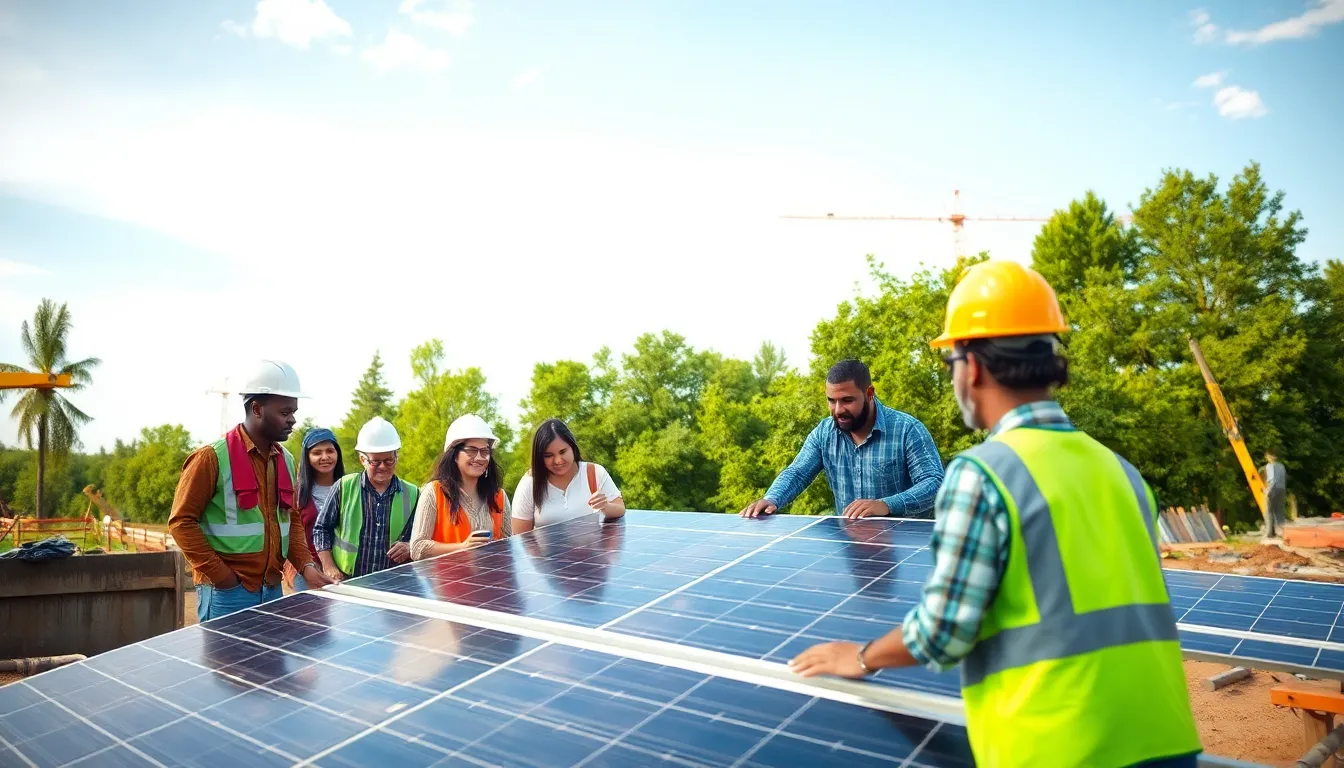In a world where the latest gadgets often come with a hefty environmental price tag, sustainable technology solutions are like the superheroes we didn’t know we needed. Imagine a future where your smartphone doesn’t just connect you to friends but also helps save the planet. It sounds like a plot twist in a sci-fi movie, but it’s happening right now.
Table of Contents
ToggleOverview of Sustainable Technology Solutions
Sustainable technology solutions emerge as critical components in addressing environmental challenges. These solutions encompass various innovations designed to minimize ecological footprints while enhancing efficiency. Renewable energy sources like solar panels and wind turbines exemplify how technology can promote sustainability. These advancements provide cleaner alternatives to fossil fuels and reduce greenhouse gas emissions.
Energy-efficient devices play a significant role in sustainable technology. Many new gadgets incorporate features that consume less energy compared to their predecessors. Smart home technologies allow users to monitor and control energy usage effectively, resulting in both cost savings and lower energy demand.
Circular economy principles guide the design of sustainable technology solutions. Devices are created with recyclability in mind, reducing electronic waste. Companies increasingly prioritize materials that are biodegradable or recyclable, facilitating a more sustainable lifecycle for their products.
Innovative developments in transportation further illustrate the value of sustainable technology. Electric vehicles contribute to reduced air pollution and improved urban mobility. Charging infrastructure expansion supports the shift towards more sustainable transportation options.
Digital platforms also facilitate sustainable practices. Applications promoting sharing economy concepts encourage resource sharing and reduce overall consumption. These tools empower individuals and communities to adopt sustainable behaviors.
Research and development focus on enhancing the sustainability of existing technologies. Emerging solutions, such as biodegradable electronics, aim to minimize environmental impact. Discoveries in green chemistry unlock new materials that are less harmful to ecosystems.
Sustainable technology solutions signify a proactive approach to environmental stewardship. By integrating these innovations into daily life, individuals and organizations contribute to a healthier planet while benefiting from advanced functionalities.
Types of Sustainable Technology Solutions

Sustainable technology solutions encompass various innovations that address environmental challenges effectively. These solutions play a vital role in building a more sustainable future.
Renewable Energy Sources
Solar panels and wind turbines rank among the most recognized forms of renewable energy. They provide clean alternatives to fossil fuels and contribute to significantly reducing greenhouse gas emissions. Biomass and hydroelectric power also stand out as valuable renewable options. Each source offers unique benefits, allowing for a diversified energy portfolio. As technology advances, efficiency improves, making these resources more accessible for consumers and businesses alike.
Green Building Technologies
Green building technologies emphasize energy efficiency and resource conservation in construction. Materials designed to reduce heat loss optimize energy consumption, enhancing overall building performance. Smart building systems enable real-time energy monitoring, providing insights that save costs while minimizing waste. Incorporating sustainable materials, like recycled steel and low-VOC paints, leads to healthier indoor environments. Adoption of these technologies fosters more sustainable cities, promoting well-being for inhabitants.
Waste Management Innovations
Innovative waste management solutions significantly impact environmental sustainability. Advanced recycling processes reduce the volume of materials sent to landfills. Techniques such as composting organic waste transform what would be trash into nutrient-rich soil, supporting local agriculture. Additionally, waste-to-energy technologies convert refuse into usable energy, maximizing resource potential. Smart waste bins that track fill levels enhance collection efficiency and minimize operational costs. Embracing these innovations fosters a circular economy, driving forward sustainable practices.
Benefits of Sustainable Technology Solutions
Sustainable technology solutions offer numerous benefits across multiple sectors, enhancing both environmental health and economic growth.
Environmental Impact
Sustainable technologies significantly reduce environmental harm. Innovations like solar panels and wind turbines lower greenhouse gas emissions compared to fossil fuels. Cleaner energy sources minimize reliance on non-renewable resources. Waste management advancements, such as recycling processes, contribute to lowering landfill waste. They also promote a circular economy that encourages resource reuse. Electric vehicles help decrease air pollution in urban areas, improving air quality. Sustainable practices further support biodiversity by reducing habitat destruction.
Economic Advantages
Cost savings emerge from implementing sustainable technologies. Energy-efficient appliances lower utility bills, benefiting consumers in the long run. Investments in renewable energy create jobs in manufacturing and installation, boosting local economies. Companies adopting sustainable practices often experience enhanced brand loyalty and customer satisfaction. Public initiatives supporting green technologies generate economic growth through innovation. Tax incentives frequently accompany the installation of renewable energy systems, further enhancing affordability. Sustainable practices minimize resource consumption while maintaining productivity, leading to healthier profit margins.
Social Benefits
Communities benefit from the adoption of sustainable technology solutions. Improved air quality enhances public health, reducing healthcare costs associated with pollution-related illnesses. Smart city technologies promote safer environments through efficient resource management. Sustainable innovations increase access to clean power, especially in underserved areas. They foster inclusivity by supporting job creation in green sectors. Education on sustainability strengthens community engagement and awareness. Additionally, technology that encourages collaborative consumption promotes a sense of community while reducing overall resource demand.
Challenges in Implementing Sustainable Technology Solutions
Implementing sustainable technology solutions faces several challenges. These hurdles can impede progress toward eco-friendly advancements in various sectors.
Technological Barriers
Technology often lacks the necessary infrastructure for widespread adoption. Many existing systems do not integrate seamlessly with new sustainable solutions. Compatibility issues hinder the effective deployment of innovations. Reliability concerns may also arise, discouraging businesses from investing in unproven technologies. Additionally, limited research can slow down the development of essential technologies. This limitation affects the commercialization of groundbreaking ideas. Education gaps in sustainable tech skillsets may further restrict workforce readiness.
Financial Challenges
Financial obstacles frequently obstruct the path to sustainable technology adoption. High initial costs deter businesses from making the switch to greener solutions. Limited access to funding inhibits startups focused on innovative eco-friendly technologies. Investors may show reluctance to finance projects that lack immediate profitability. Operational costs of integrating sustainable technologies can also present challenges for organizations. Long-term financial models emphasizing cost savings often take time to materialize. Lack of government incentives can diminish the motivation to invest in sustainable practices.
Future Trends in Sustainable Technology Solutions
Emerging technologies show promise in advancing sustainable practices. Innovations like artificial intelligence enhance energy efficiency by optimizing resource use across various sectors. Renewable energy, particularly solar and wind, continues to grow as viable sources thanks to improved efficiency and cost-effectiveness.
Electric vehicles gain traction as more manufacturers commit to eco-friendly transportation. Enhanced battery technologies lead to increased range and shorter charging times, making electric options more appealing. Alongside this, the expansion of charging networks significantly supports the transition to electric mobility.
Biodegradable materials enter mainstream production, reducing reliance on plastics and fostering a circular economy. This shift in packaging and product design encourages consumers to prioritize sustainability in their purchases. Smart home technologies enable individuals to monitor energy consumption in real-time, minimizing waste and promoting conservation.
Research also focuses on green chemistry, creating products with lower environmental impact through sustainable processes. Such advancements reduce harmful byproducts, enhancing the sustainability of various industries. Waste-to-energy technologies transform waste into energy, decreasing landfill dependence while addressing waste management challenges.
As businesses embrace sustainable practices, job opportunities increase in renewable energy sectors. The shift enhances economic growth, creating a more resilient workforce equipped for the green economy. Increased investment in sustainable technologies fosters not only environmental benefits but also improved public health through cleaner air and reduced pollution.
Greater collaboration among stakeholders drives initiatives that promote resource-sharing platforms. Apps that connect users for sharing tools or services contribute to reduced consumption overall. Engaging communities in sustainability efforts encourages broader participation in eco-friendly practices, solidifying the foundation for a greener future.
Sustainable technology solutions are paving the way for a greener future. By embracing innovations that minimize ecological footprints and enhance efficiency, society can address pressing environmental challenges head-on. The shift towards renewable energy sources and energy-efficient devices not only benefits the planet but also fosters economic growth and public health improvements.
As advancements continue in areas like biodegradable materials and smart technologies, the potential for a sustainable future becomes increasingly tangible. Overcoming existing barriers will require collaboration among businesses, governments, and communities. Together, they can cultivate an environment where sustainable practices thrive, ensuring a healthier planet for generations to come.






